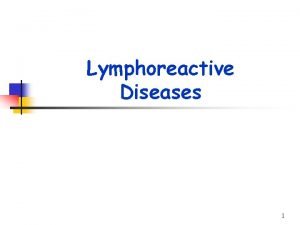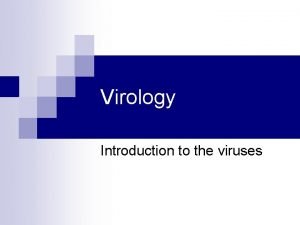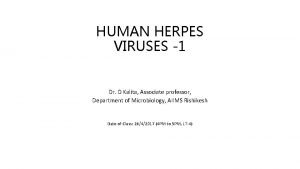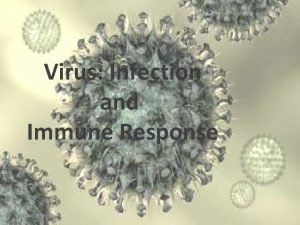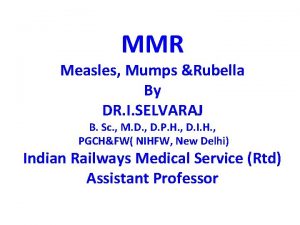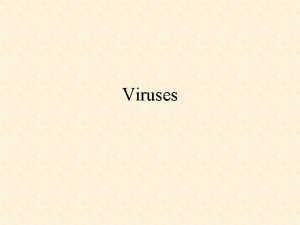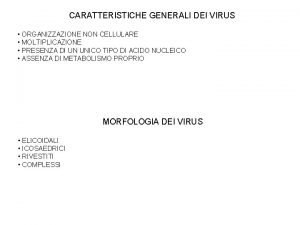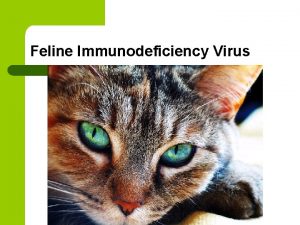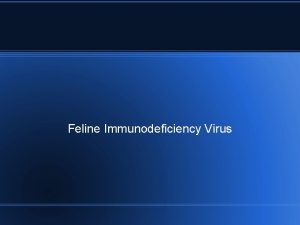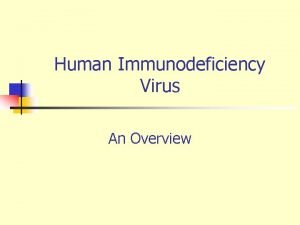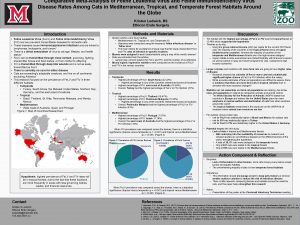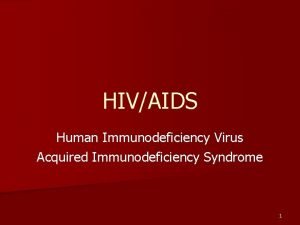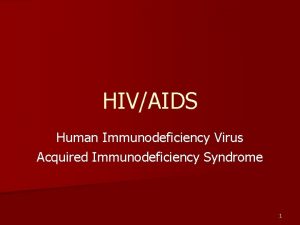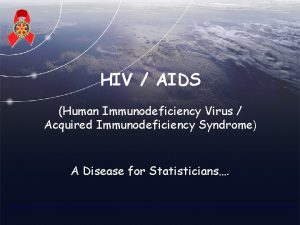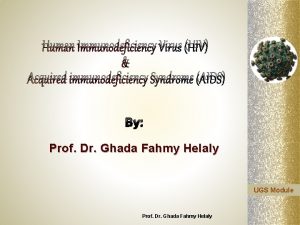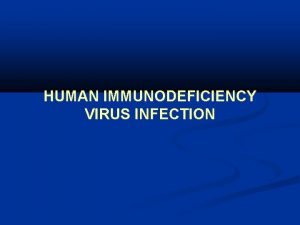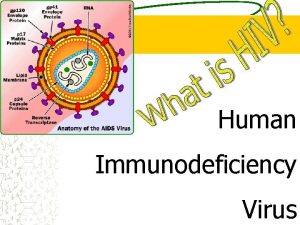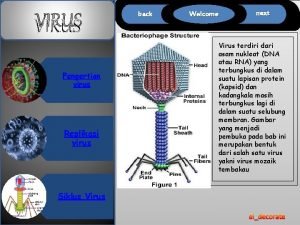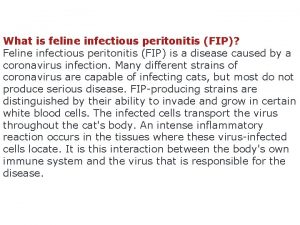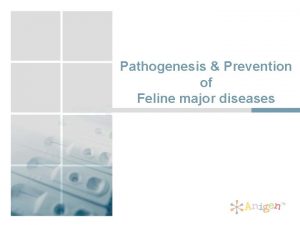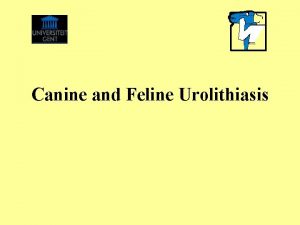What is Feline Immunodeficiency Virus Virologists classify feline



















- Slides: 19

What is Feline Immunodeficiency Virus? Virologists classify feline immunodeficiency virus (FIV) as a lentivirus (or "slow virus"). FIV is in the same retrovirus family as feline leukemia virus (Fe. LV), but the viruses differ in many ways including their shape. FIV is elongated, while Fe. LV is more circular. The two viruses are also quite different genetically, and the proteins that compose them are dissimilar in size and composition. The specific ways in which they cause disease differ, as well.

How common is the infection? FIV-infected cats are found worldwide, but the prevalence of infection varies greatly. In the United States, approximately 1. 5 to 3 percent of healthy cats are infected with FIV. Rates rise significantly-15 percent or more-in cats that are sick or at high risk of infection. Because biting is the most efficient means of viral transmission, free-roaming, aggressive male cats are the most frequently infected, while cats housed exclusively indoors are much less likely to be infected.

How is FIV spread? The primary mode of transmission is through bite wounds. Casual, non-aggressive contact does not appear to be an efficient route of spreading FIV; as a result, cats in households with stable social structures where housemates do not fight are at little risk for acquiring FIV infections. On rare occasions infection is transmitted from an infected mother cat to her kittens, usually during passage through the birth canal or when the newborn kittens ingest infected milk. Sexual contact is not a major means of spreading FIV.

What does FIV do to a cat? Infected cats may appear normal for years. However, infection eventually leads to a state of immune deficiency that hinders the cat's ability to protect itself against other infections. The same bacteria, viruses, protozoa, and fungi that may be found in the everyday environment-where they usually do not affect healthy animals--can cause severe illness in those with weakened immune systems. These secondary infections are responsible for many of the diseases associated with FIV.

What are the signs of disease caused by FIV? Early in the course of infection, the virus is carried to nearby lymph nodes, where it reproduces in white blood cells known as T-lymphocytes. The virus then spreads to other lymph nodes throughout the body, resulting in a generalized but usually temporary enlargement of the lymph nodes, often accompanied by fever. This stage of infection may pass unnoticed unless the lymph nodes are greatly enlarged.

An infected cat's health may deteriorate progressively or be characterized by recurrent illness interspersed with periods of relative health. Sometimes not appearing for years after infection, signs of immunodeficiency can appear anywhere throughout the body.

• Poor coat condition and persistent fever with a loss of appetite are commonly seen. • Inflammation of the gums (gingivitis) and mouth (stomatitis) and chronic or recurrent infections of the skin, urinary bladder, and upper respiratory tract are often present. • Persistent diarrhea can also be a problem, as can a variety of eye conditions. • Slow but progressive weight loss is common, followed by severe wasting late in the disease process. • Various kinds of cancer and blood diseases are much more common in cats infected with FIV, too. • In unspayed female cats, abortion of kittens or other reproductive failures have been noted. • Some infected cats experience seizures, behavior changes, and other neurological disorders.

How is infection diagnosed? Antibody tests detect the presence of antibody in the blood of infected cats.

Positive results • Because few, if any, cats ever eliminate infection, the presence of antibody indicates that a cat is infected with FIV. This test can be performed by most veterinary diagnostic laboratories and also is available in kit form for use in veterinary clinics. Since falsepositive results may occur, veterinarians recommend that positive results be confirmed using a test with a different format. • Infected mother cats transfer FIV antibodies to nursing kittens, so kittens born to infected mothers may receive positive test results for several months after birth. However, few of these kittens actually are or will become infected. To clarify their infection status, kittens younger than six months of age receiving positive results should be retested at 60 -day intervals until they are at least six months old.

Negative results • A negative test result indicates that antibodies directed against FIV have not been detected, and, in most cases, this implies that the cat is not infected. Nevertheless, it takes eight to 12 weeks after infection (and sometimes even longer) before detectable levels of antibody appear, so if the test is performed during this interval, inaccurate results might be obtained. Therefore, antibody-negative cats with either an unknown or a known exposure to FIV-infected catssuch as through the bite of an unknown cat-should be retested a minimum of 60 days after their most recent exposure in order to allow adequate time for development of antibodies. • On very rare occasions, cats in the later stages of FIV infection may test negative because their immune systems are so compromised that they no longer produce detectable levels of antibody

Polymerase chain reaction (PCR) tests are designed to detect short segments of a virus's genetic material. While antibody-based tests are ideal screening tests for infection, in certain situations (such as confirming infection in antibody-positive kittens or determining infection of cats vaccinated with antibody-producing FIV vaccines), PCR-based tests, in theory, would be superior. Although PCR testing methods offer promise and are being actively explored, at this time unacceptable numbers of false-positive and false-negative results prevent them from routinely being recommended.

The only sure way to protect cats is to prevent their exposure to the virus. Cat bites are the major way infection is transmitted, so keeping cats indoors-and away from potentially infected cats that might bite themmarkedly reduces their likelihood of contracting FIV infection. For the safety of the resident cats, only infection-free cats should be adopted into a household with uninfected cats.

Vaccines to help protect against FIV infection are now available. However, not all vaccinated cats will be protected by the vaccine, so preventing exposure will remain important, even for vaccinated pets. In addition, vaccination may have an impact on future FIV test results. It is important that you discuss the advantages and disadvantages of vaccination with your veterinarian to help you decide whether FIV vaccines should be administered to your cat.

Unfortunately, many FIV-infected cats are not diagnosed until after they have lived for years with other cats. In such cases, all the other cats in the household should be tested, as well. Ideally, all infected cats should be separated from the noninfected ones to eliminate the potential for FIV transmission. If this is not possible-and if fighting or rough play is not taking place-the risk to the non-infected cats appears to be low.

• FIV-infected cats should be confined indoors to prevent spread of FIV infection to other cats in the neighborhood and to reduce their exposure to infectious agents carried by other animals. • FIV-infected cats should be spayed or neutered. • They should be fed nutritionally complete and balanced diets. • Uncooked food, such as raw meat and eggs, and unpasteurized dairy products should not be fed to FIV-infected cats because the risk of food-borne bacterial and parasitic infections is much higher in immunosuppressed cats. • Wellness visits for FIV-infected cats should be scheduled with your veterinarian at least every six months. Although a detailed physical examination of all body systems will be performed, your veterinarian will pay special attention to the health of the gums, eyes, skin, and lymph nodes. Your cat's weight will be measured accurately and recorded, because weight loss is often the first sign of deterioration. A complete blood count, serum biochemical analysis, and a urine analysis should be performed annually.

• Vigilance and close monitoring of the health and behavior of FIV-infected cats is even more important than it is for uninfected cats. Alert your veterinarian to any changes in your cat's health as soon as possible. • There is no evidence from controlled scientific studies to show that immunomodulator, alternative, or antiviral medications have any positive benefits on the health or longevity of healthy FIV-infected cats. However, some antiviral therapies have been shown to benefit some FIV-infected cats with seizures or stomatitis.

It is impossible to accurately predict the life expectancy of a cat infected with FIV. With appropriate care and under ideal conditions, many infected cats will remain in apparent good health for many months or years. If your cat has already had one or more severe illnesses as a result of FIV infection, or if persistent fever and weight loss are present, a much shorter survival time can be expected.

Feline immunodeficiency virus will not survive outside the cat for more than a few hours in most environments. However, FIV-infected cats are frequently infected with other infectious agents that may pose some threat to a newcomer. Thoroughly clean and disinfect or replace food and water dishes, bedding, litter pans, and toys. A dilute solution of household bleach (four ounces of bleach in 1 gallon of water) makes an excellent disinfectant. Vacuum carpets and mop floors with an appropriate cleanser. Any new cats or kittens should be properly vaccinated against other infectious agents before entering the household.

Under what circumstances should FIV testing be performed? • If your cat has never been tested. • If your cat is sick, even if it tested free of infection in the past but subsequent exposure can't be ruled out. • When cats are newly adopted, whether or not they will be entering a household with other cats. • If your cat has recently been exposed to an infected cat. • If your cat is exposed to cats that may be infected (for example, if your cat goes outdoors unsupervised or lives with other cats that might be infected). Your veterinarian may suggest testing periodically (yearly) as long as your cat is exposed to potentially infected cats. • If you're considering vaccinating with an FIV vaccine.
 What are deficiency
What are deficiency Combined immunodeficiency
Combined immunodeficiency Human skull with restored features from jericho
Human skull with restored features from jericho Feline
Feline Cardiopet probnp feline 1,500
Cardiopet probnp feline 1,500 Eber
Eber Sign of affection candy
Sign of affection candy Feline histiocytosis
Feline histiocytosis Bite with crackling noise candy bar
Bite with crackling noise candy bar Helical virus
Helical virus Human herpesvirus 2
Human herpesvirus 2 Monera virus
Monera virus Perbedaan replikasi virus dna dan rna
Perbedaan replikasi virus dna dan rna Baltimore classification of virus
Baltimore classification of virus Laroux virus
Laroux virus Mumps medicine
Mumps medicine Habit 1 be proactive examples
Habit 1 be proactive examples Malware versus virus
Malware versus virus Concatenameri
Concatenameri Tomislav šperanda
Tomislav šperanda





